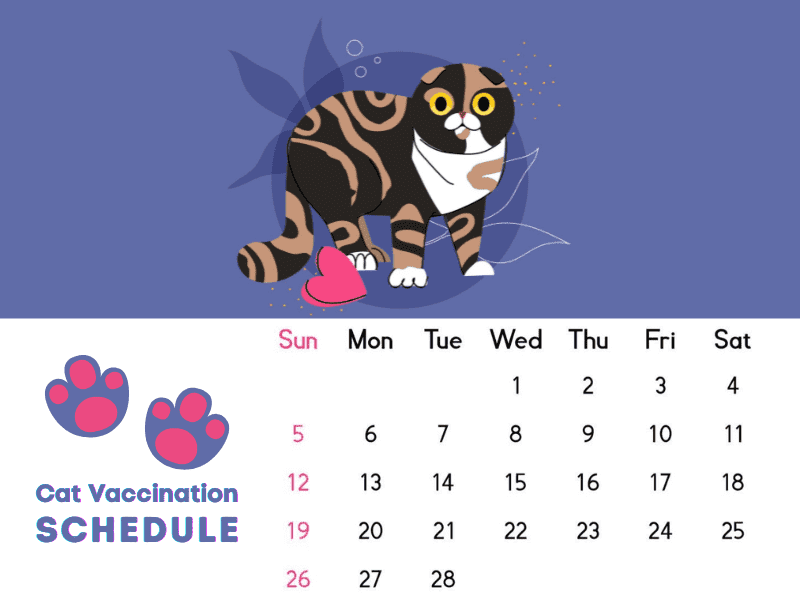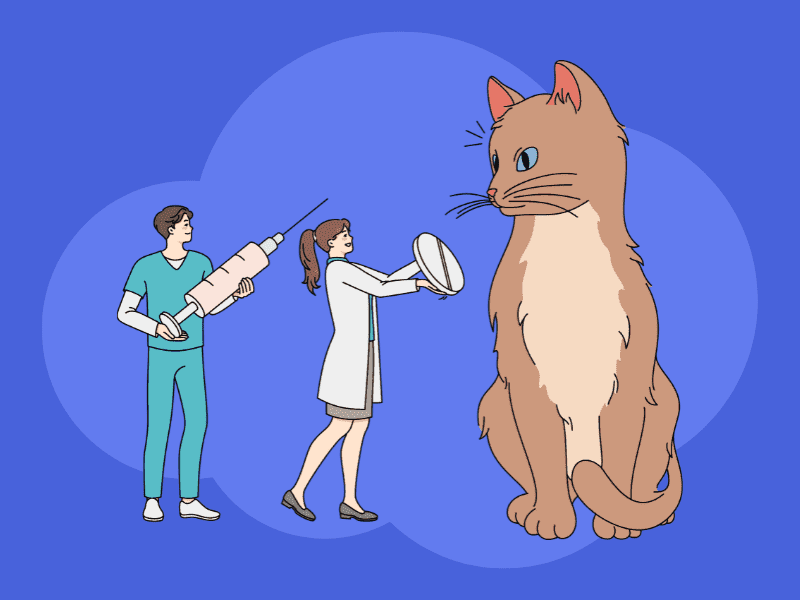
Cat Vaccination - Vaccinating your cat is a critical part of keeping them healthy and safe. But with so many different types of vaccines available, it can be difficult to know which ones are necessary for your pet.
In this blog article, we’ll explain why it’s important to vaccinate your cat and the different types of vaccines available. We’ll also provide you with helpful tips to make sure your cat gets all the vaccinations they need to stay healthy and happy.
Table of Contents
- What is a Cat Vaccination?
- The Different Types of Cat Vaccines
- Cat Vaccination Types in Malaysia
- How Do Vaccines Work?
- Why is Cat Vaccination Important?
- When Should I Vaccinate My Cat?
- How Often Should My Cat Be Vaccinated?
- Cat Vaccination Schedule
- The Risks and Side Effects
- Where Can I Get My Cat Vaccinated?
- Frequently Asked Questions
- Conclusion
What is a Cat Vaccination?
As a responsible cat owner, it's important to vaccinate your feline friend to help protect them from potentially deadly diseases. While there are a variety of vaccinations available for cats, the most common are for feline panleukopenia virus (FPV), feline calicivirus (FCV), and feline herpesvirus type 1 (FHV-1).
FPV is a highly contagious disease that can affect cats of all ages and can be fatal in young kittens. FCV is another serious disease that can cause upper respiratory infections in cats, and FHV-1 is the primary cause of "feline colds." All three of these diseases are common in unvaccinated cats, so vaccinating your cat is one of the best ways to help keep them healthy and safe.
The Different Types of Cat Vaccines
There are a few different types of vaccines available for cats. The most common are the feline panleukopenia (FPV) vaccine, which protects against a highly contagious and often deadly disease, and the feline herpesvirus-1 (FHV-1) vaccine, which protects against a virus that can cause respiratory infections, eye problems, and neurological disease.
There are also vaccines available for other conditions, such as feline leukemia virus (FeLV), chlamydia, and Bordetella. Your veterinarian will be able to recommend the best vaccinations for your cat based on their lifestyle and health history.
Indoor cats, for example, are less likely to contract certain diseases than outdoor cats. Because their immune systems aren't fully developed yet, kittens need to be vaccinated more often than adult cats.
Vaccines are an important part of keeping your cat healthy and preventing them from spreading disease to other animals or people. Talk to your veterinarian about which vaccines are right for your cat.
Cat Vaccination Types in Malaysia

There are a few different types of cat vaccinations available in Malaysia, each with their own purpose and benefits. The most common types of vaccines are those for feline panleukopenia (also known as feline distemper), feline calicivirus, and feline herpesvirus 1.
These vaccines are typically given to kittens at around 8 weeks of age, with booster shots every 3–4 weeks until they are 16 weeks old. Other types of vaccines that may be recommended depending on the area you live in and your cat's lifestyle include those for rabies, feline leukemia virus, and Bordetella bronchiseptica (a bacteria that can cause respiratory infections).
Some of these vaccines are given as annual boosters, while others may only need to be given once or twice in a lifetime. Talk to your veterinarian about which vaccines are right for your cat based on their individual risk factors.
How Do Vaccines Work?
Vaccines work by protecting your cat from diseases. When a vaccine is given, it helps the body create immunity against the disease. The immunity can help your cat if she is ever exposed to the disease. Vaccines are usually given as injections, but some can be given as oral medications.
Vaccines contain antigens, which are substances that mimic the disease-causing organism. When these antigens enter the body, they stimulate the body’s immune system to create antibodies, which recognize and fight against the disease-causing organism if it ever enters the body. The antibodies help to protect your cat from getting sick if she is exposed to the disease.
Why is Cat Vaccination Important?
As a cat owner, you want to do everything you can to keep your feline friend healthy and happy. Part of that responsibility is making sure your cat is up-to-date on its vaccinations.
Vaccinations help protect cats from serious and sometimes deadly diseases. They work by preparing the cat’s immune system to recognize and fight off disease-causing viruses or bacteria.
Cats can be vaccinated against a variety of diseases, including rabies, feline viral rhinotracheitis (FVR), feline calicivirus (FCV), and feline panleukopenia virus (FPV). Some of these diseases are more common in certain parts of the world than others, so talk to your veterinarian about which vaccines are right for your cat based on their risk factors.
Vaccinating your cat is one of the simplest and most effective ways to help keep them healthy for years to come.
When Should I Vaccinate My Cat?

Vaccinating your cat is important to help prevent them from getting sick. There are many different types of vaccines available for cats, and it is important to talk to your veterinarian to determine which vaccines are right for your cat based on their lifestyle and health status.
Most kittens should start receiving vaccines at around 6–8 weeks of age. The initial vaccine series usually consists of 3–4 vaccinations given 2–4 weeks apart. Booster vaccinations are then given annually to help maintain immunity against disease.
There are a few core vaccines that are recommended for all cats, such as those against rabies and panleukopenia (also known as feline distemper). Other vaccines may be suggested based on your cat's unique risk factors, such as how often it interacts with other animals or where it will be going.
It is also important to keep up with annual wellness exams and testing for infectious diseases, even if your cat appears healthy. This can help catch any problems early and keep your cat happy and healthy for years to come!
How Often Should My Cat Be Vaccinated?
It's important to keep your cat up-to-date on vaccinations to help prevent them from contracting serious diseases. But how often should they be vaccinated? The answer may vary depending on your cat's age, lifestyle, and health status. Here's a general guide:
Kittens: It's important to get kittens vaccinated as soon as possible so they're protected from disease. They should receive a series of two or three shots starting at around six to eight weeks old, then booster shots every three to four weeks until they're 16 weeks old. After that, they should receive an annual booster shot.
Adult cats: If your cat is up-to-date on vaccinations, they'll just need an annual booster shot. However, if they're behind on their shots or if their vaccination history is unknown, they'll need a series of two or three shots before receiving the annual booster shot.
Senior cats: Older cats may not need to be vaccinated as often as younger ones. Talk to your vet about how often your senior cat needs to be vaccinated and if they need any special care because of their age or health.
No matter the age or health of your cat, it's important to keep them up-to-date on vaccinations. This helps protect them from serious illnesses and can help ensure they lead a happy and healthy life.
Cat and Kitten Vaccination Schedule

As a responsible cat owner, it's important to know the vaccination schedule for your feline friend. Cats and kittens need a few different vaccinations throughout their lives to protect them from deadly diseases.
Here's a quick rundown of the cat and kitten vaccination schedule:
1. 8 weeks: feline distemper, feline herpesvirus 1, and feline calicivirus
2. 12 weeks: feline distemper, feline herpesvirus-1, feline calicivirus, and rabies (optional).
3. 16 weeks: feline distemper, feline herpesvirus-1, feline calicivirus, and rabies (optional).
4. 1 year: booster shots for all vaccines except rabies (which is given every 3 years).
As you can see, cats need several rounds of vaccinations in the first few months of their lives. After that, they'll just need booster shots once a year, except for rabies, which is given every 3 years.
Of course, always check with your veterinarian to make sure your cat is up-to-date on its vaccinations. They can help you tailor the vaccination schedule to your cat's individual needs.
The Risks And Side Effects of Cat Vaccination?
There are always risks associated with any kind of medical procedure, including vaccinations. The most common side effect of cat vaccination is soreness and redness at the injection site.
Some cats may also experience temporary lethargy or a loss of appetite. In very rare cases, more serious reactions can occur. If you notice any of these side effects in your cat, please contact your veterinarian immediately.
Read : How to Prevent Your Cat From Getting Sick (14 Healthy Tips)
Where Can I Get My Cat Vaccinated?

The first place to start when you are thinking about vaccinating your cat is with your veterinarian. They will be able to help you understand the risks and benefits of vaccination and tailor a vaccination plan for your cat based on their health and lifestyle.
There are also a number of other organizations that offer vaccinations for cats, such as shelters, humane societies, and some pet stores. It's important to remember that vaccination is only one part of keeping your cat healthy; providing a regular check-up, parasite prevention, and good nutrition are also essential for your cat's health and wellbeing.
Frequently Asked Questions
1. What are the core vaccines for cats?
The core vaccinations for cats typically include feline panleukopenia (also known as feline distemper), feline rhinotracheitis, and calicivirus. Non-core vaccines may also be recommended based on risk factors, lifestyle, and geographic region.
2. When should a cat be vaccinated?
Kittens typically receive their first set of vaccinations at 8–9 weeks old. The vaccines are then boosted every 3–4 weeks until the kitten is 16 weeks old. After that, annual vaccinations are recommended.
3. Are there any risks associated with cat vaccinations?
While most cats do not experience any adverse reactions to vaccines, some may experience mild side effects such as fever, lethargy, or appetite loss. Severe reactions are rare and typically require immediate medical attention.
4. What is the 3-in-1 vaccine for cats?
The 3 in 1 vaccine is a combination vaccine that protects cats from feline panleukopenia, feline rhinotracheitis, and calicivirus. Most of the time, this vaccine is given to kittens as part of their first set of shots.
5. Do indoor cats need vaccines?
Even if a cat stays inside, it should still get vaccinated on a regular basis because it could still get sick from something that spreads.
6. Can I vaccinate my cat myself?
No, you should have a vet give the vaccines to make sure they are given in the right amount and are safe.
7. Do I really need to vaccinate my cat every year?
Yes, annual vaccinations are recommended to keep your cat's immunity up and protect it from diseases that can spread.
8. Which vaccine is not recommended for cats?
The rabies vaccine is not recommended for cats, as the risk of exposure to rabies in cats is very low.
9. When should a kitten be vaccinated in Malaysia?
In Malaysia, the recommended vaccination schedule for kittens is 8 weeks (primary), 12 weeks (booster 1), and 16 weeks (booster 2).
10. What happens if the kitten is not vaccinated?
If a kitten isn't vaccinated, it may be more likely to get diseases like feline panleukopenia, feline herpesvirus, and calicivirus, which can kill cats if they don't get treated.
11. How long can a cat go without shots?
It is important to follow the recommended vaccination schedule for cats in order to maintain immunity. If your cat goes too long without vaccinations, they may be more susceptible to illnesses.
12. At what age are kittens fully vaccinated?
By the age of 16 weeks, kittens typically have received all of their vaccinations.
Read: Parvo in Cats (Parvovirus)
Conclusion
Cat vaccination is an important part of keeping your pet healthy and safe from dangerous and sometimes deadly diseases. Vaccines help protect cats against a variety of infections, including feline leukemia, feline immunodeficiency virus, and rabies. - Posh Pet Vet Clinic
With the proper preventative care, you can help ensure that your beloved cat remains safe and healthy for years to come. If you have any questions about vaccines or other aspects of your cat’s health, be sure to speak with your veterinarian so that they can provide the best advice possible. - Bukit Besi Blog